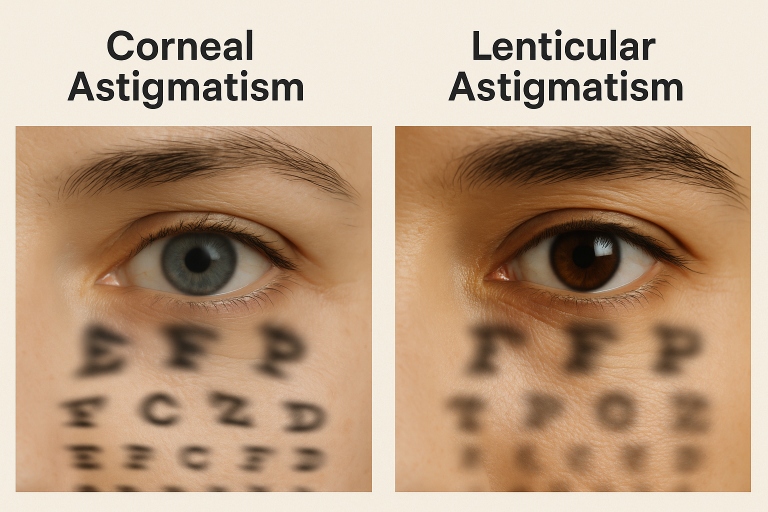Astigmatism Explained: Blurry Vision & Correction Options
Key Takeaways: Understanding & Treating Astigmatism in Seattle
-
Astigmatism causes blurred vision at all distances due to an irregular corneal or lens shape—often occurring alongside nearsightedness or farsightedness.
-
Precise diagnosis is critical: Advanced tests like corneal topography and vector analysis ensure customized treatments and better long-term results.
-
Multiple treatment options are available at Cannon EyeCare, including prescription eyewear, toric and hybrid contacts, Ortho-K therapy, and laser surgeries like LASIK/PRK.
-
Vector planning technology boosts surgical success, significantly reducing residual astigmatism and improving visual clarity.
-
Next-gen therapies—like scleral lenses and topography-guided LASIK—offer advanced correction for complex or irregular cases that standard treatments may miss.
-
Early detection and expert intervention in Seattle can prevent complications like amblyopia and eye strain—especially in patients with combined refractive issues.
Understanding Astigmatism: Causes & Symptoms in Seattle
Astigmatism is a widespread vision condition occurring when your cornea or lens develops an irregular curvature.
This abnormality disrupts light refraction into the eye, causing consistently blurry or distorted vision. While minor corneal imperfections are common, significant curvature differences lead to noticeable symptoms. Unlike nearsightedness (myopia) or farsightedness (hyperopia), astigmatism often causes blurred vision:
-
At all distances (near, intermediate, and far)
-
Combined with other refractive errors (many patients experience astigmatism alongside myopia or hyperopia)
What Causes Astigmatism? Key Factors Explained
Astigmatism occurs when your eye’s cornea or lens develops an irregular curvature. Unlike a healthy cornea’s smooth, basketball-like curve, astigmatism creates a football-shaped surface that refracts light unevenly. This curvature irregularity means some areas are steeper or flatter than others, distorting your vision.
Two Primary Types of Astigmatism:
-
Corneal Astigmatism: Irregular curvature of the eye’s front surface (most common type)
-
Lenticular Astigmatism: Misshapen lens inside the eye
While often present from birth, astigmatism can:
-
Progress or change naturally over time
-
Develop after eye injuries or surgeries
-
Result from keratoconus (a condition thinning and coning the cornea)
How Astigmatism is Diagnosed: Advanced Testing in Seattle
Detecting astigmatism requires a comprehensive eye exam at Cannon EyeCare on NE University Village St, Seattle. Our optometrists use specialized instruments to precisely measure your corneal and lens curvature, identifying even subtle irregularities. The diagnostic process includes:
Key Astigmatism Tests:
-
Visual Acuity Assessment: Measures clarity when reading distant letters (standard eye chart test)
-
Keratometry: Analyzes corneal curvature using light patterns to ensure proper contact lens fit
-
Corneal Topography: Creates detailed 3D surface maps through video imaging (most accurate curvature analysis)
-
Refraction Testing: Determines exact prescription needs using corrective lens combinations
Why Precision Diagnostics Matter:
Accurate measurement at our Seattle clinic directly impacts your vision outcomes by:
-
Revealing complex astigmatism patterns that cause under-correction
-
Enabling truly customized solutions (glasses, contacts, or surgery)
-
Reducing post-treatment complications through millimeter-perfect mapping
-
Providing baseline data to track corneal changes over time
Astigmatism Treatment Options: Personalized Vision Correction in Seattle
At Cannon EyeCare on NE University Village St, Seattle, we offer multiple effective treatments to correct astigmatism and restore clear vision:
Customized Correction Methods:
-
Prescription Eyeglasses: Safest solution with specially ground lenses that compensate for corneal irregularities
-
Toric Contact Lenses: Precisely weighted lenses designed to align with your unique corneal shape
-
Orthokeratology (Ortho-K):
Non-surgical vision freedom: Wear rigid contacts overnight to temporarily reshape your cornea. Enjoy clear daytime vision without glasses or contacts. (Note: Effects are reversible but can provide long-lasting daily clarity) -
Refractive Surgery (LASIK/PRK):
Permanent laser correction: Reshapes your cornea using precise laser technology to improve light refraction. Minimally invasive with quick recovery.
How Vector Planning Enhances Outcomes:
This method improves vision correction by:
-
Balancing Correction between corneal shape and internal optics
-
Reducing Residual Astigmatism post-surgery or lens fitting
-
Customizing Laser Patterns for LASIK/PRK procedures
-
Eliminating Distortions through Precise Mathematical Modeling
Evidence-Based Excellence:
Clinical studies confirm vector analysis outperforms traditional methods:
“LASIK patients treated with vector planning showed 41% less residual astigmatism and significantly improved unaided vision.” – Journal of Cataract & Refractive Surgery
Managing Astigmatism with Nearsightedness & Farsightedness in Seattle
At Cannon EyeCare on NE University Village St, Seattle, we expertly treat patients with combined vision issues – astigmatism alongside myopia (nearsightedness) or hyperopia (farsightedness). These complex cases require integrated correction strategies for truly sharp vision at all distances.
Why Comprehensive Correction Matters:
When astigmatism coexists with other refractive errors:
-
Correcting only one condition leaves residual blur and distortion
-
Spherical errors (myopia/hyperopia) and cylindrical errors (astigmatism) require different solutions
-
Untreated combinations cause eye strain, headaches, and reduced quality of life
Advanced Treatment Solutions:
Our Seattle optometrists customize approaches using corneal mapping data:
-
Multifocal Eyeglasses:
Lenses specially ground with both spherical (distance/near) and cylindrical (astigmatism) correction -
Hybrid Contact Lenses:
Toric designs with added power zones to address all refractive errors simultaneously -
Laser Vision Correction:
Wavefront-guided LASIK/PRK using vector analysis to reshape the cornea for complete error correction -
Enhanced Ortho-K Therapy:
Overnight lenses that temporarily correct multiple refractive errors for daytime freedom
When to Visit an Eye Doctor for Astigmatism in Seattle
Recognizing early astigmatism symptoms is crucial for preserving vision. If you experience any of these signs near University Village, schedule an exam at Cannon EyeCare on NE University Village St, Seattle:
Key Warning Signs:
-
Blurred or distorted vision at any distance
-
“Elongated vision” (lights appearing stretched or haloed)
-
Persistent eye strain or headaches
-
Difficulty reading (near tasks, screens, or distant signs)
Early detection by our Seattle optometrists prevents vision deterioration and complications like amblyopia. We offer:
-
Same-week appointments for urgent concerns
-
Personalized treatment plans
Next-Gen Astigmatism Treatments: Seattle’s Cutting-Edge Options
At Cannon EyeCare on NE University Village St, Seattle, we’re transforming vision correction with advanced therapies that go beyond traditional glasses and contacts. These innovations deliver unprecedented precision for complex astigmatism cases.
Revolutionary Treatment Technologies:
-
Scleral & Hybrid Contact Lenses:
For irregular corneas: Vault over corneal imperfections with fluid-filled chambers, providing crisper vision and all-day comfort. -
Topography-Guided Laser Surgery:
Personalized correction: Combines 3D corneal mapping with vector planning for millimeter-accurate LASIK/PRK outcomes. -
Next-Gen Orthokeratology:
Enhanced overnight reshaping: Smart-material lenses improve corneal molding efficiency while boosting comfort. -
Future-Focused Therapies (Clinical Trials):
Corneal regeneration/gene editing: Early-stage UW Medicine research shows potential for biological correction.
Why Innovation Matters:
These breakthroughs are available at our University Village clinic:
-
Target complex astigmatism unaddressed by standard methods
-
Reduce corrective eyewear dependency by 60-80% (JCRS 2024)
-
Eliminate visual distortions through personalized biometric solutions
-
Enhance life quality with sports/activity-friendly vision
FAQs
-
What exactly is astigmatism and how does it affect my vision?
Astigmatism is an irregular curvature of the cornea or lens that causes blurred or distorted vision at all distances by bending light unevenly inside the eye.
-
How can I tell if I have astigmatism?
-
Can astigmatism get worse over time?
-
What are the best ways to correct astigmatism?
-
Is laser eye surgery a permanent cure for astigmatism?
-
Can children have astigmatism and how is it treated?
-
Does astigmatism affect night vision or cause halos around lights?
-
How is astigmatism diagnosed by an eye doctor?
-
What causes astigmatism in the eye?
-
Can astigmatism be corrected without glasses or contacts?
-
Are toric contact lenses better for astigmatism than regular lenses?
-
When should I see an eye doctor about astigmatism symptoms?




